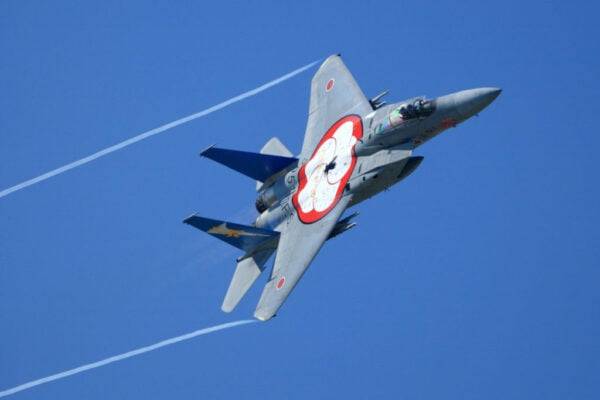
A Japanese F-15J with a cultural livery shows Japan’s close ties to the United States and their common defence posture.
Each day it appears that new conflicts are arising globally, and every month there is a change in the discussion on how these events were allowed to occur, and the best approach in resolving them. The best example of how to address many policy failures often comes from acknowledging past errors as well as learning from historical examples of successful transitions from nations at war towards nations who freely have chosen peace as their forward path. While some nations have had long traditions honouring warriors in their culture, the final word on those societies were not to extend conflict, but to seek peace, especially with former adversaries. One of the best examples of a large nation with this warrior tradition is Japan, who actively honours their past in many forms while focusing on peace and stability wherever possible.
Pre-1950s Japan was well known as an Imperial Empire that aggressively captured much of Asia and the Pacific region, subjecting their adversaries to some of the most brutal treatment known to humanity. The loss of the Second World War to the United States and Allied forces was not only a military defeat, but a cultural revolution where old customs and systems of bias were reformed and subject to liberal ideas and modern approaches. While Japanese culture and traditions varied greatly from liberal values, the following years would create a local model of modernisation and progress that is a benefit to the rest of the world and the people of Japan itself. This transition did not occur in a vacuum, but developed with set expectations and measured approaches to turn Japan into one of the most modern societies in the 21st Century.
Post War Japan suffered from the same issues as many other nations after the Second World War, with shortages and newly administered Governments heavily influenced from abroad actively reshaping Japanese culture assertively and systemically. The 1960s emerged with a challenge to Japan, as economic development, education and social welfare systems mirrored that of many developing countries at the time. A focus on economic innovation and the promotion of their economy into the larger world utilised Japan’s increasingly educated and innovative population to challenge many Western dominated industries in the 1970s. By the 1980s, the Japanese economic model was by all measures well established and extremely competitive within the global marketplace. While Japan’s economic fortunes after the 1990s began to diminish, the country tended to have similar economic problems and solutions as their partners in North America and Europe and were seen as equal allies in the global economy and dependable partners in global security.
What some might call a Japanese economic miracle did not simply arise from good economic policy and fortunate foresight of future economic opportunities, but from a change in the general world view held by many in Japan post-1950. Japan actively produced an education system and culture that was disdainful of conflict, even though much of Japan’s history involved honouring a warrior tradition. Cultural properties in Japan that are often known internationally give a window into this development, and have in turn influenced the ideas of honour and tradition in cultures abroad as a result. Films and media went from Tokyo being attacked by offshore monsters towards a re-engagement with Samurai warrior culture via showing their humanity in the application of old ideas of honour and traditions. Eventually, much of these properties focused on the soul during conflict and the exploration of humanity during war, often around a narrative that is constantly vying for a path to peace. So expansive is the idea of pushing past the limitations of conflict and honour to seek peace, that the concept of peace though force became the focus of some media properties, establishing the idea that warriors achieve their greatest honour by directly fighting to end all wars as seen in the media property Gundam 00. Ideas around peace seems to have been a national project, so much so that the language of society turned the ideas of peace and humanity into a concept rooted in honour. A warrior after the 1950s could perhaps be seen not as someone who seeks war, but as someone who fights against it in the 2020s.
Japan has taken many decades to reform itself from a nation that saw brutality and war as a part of its warrior traditions, towards a country that is a model for economic and cultural development in the 21st Century. Japan actively shows that support for peace, financially, culturally, and systemically is the likely path to stem the continuation of future wars globally. Taking the approach of funding added conflict does little for the people in those nations, and works more to weaponise a world view instead of cultivating a culture that seeks peace and stability. What is apparent in many Japanese media properties and general culture is that war has no winners, and that those who seek war are never the honourable ones in the conflict. Perhaps they are correct, there is no honour in war, and those who seek it will never be warriors or heroes without false narratives painted over their empty deeds. Achieving Peace might be the purest form of Honour.